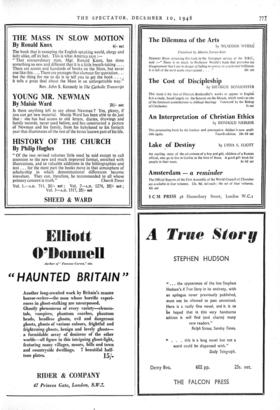Christian Humanism
Recovery of Man. By F. R. Barry. (Nisbet. 8s. 6d.)
Tint Bishop of Southwell has written a brave and timely book, brave because the obscurantist reaction in theology has not yet spent its force and timely because the pathological character of that reaction is now plainly seen. To reaffirm the principles of humanism is an essential condition for the recovery of a belief in the true- manhood of Christ which Barthian Gnosticism has gone far to destroy ; to insist upon the importance of nature and history which Barthian transcendentalism has denied is to prepare the way for a full appre- ciation of the significance of all that the scientific movement has taught us and for a fresh insight into the doctrine of the Incarnation. Dr. Barry knows Ttill well the bewilderment and tragedy of our time. He sees how essential it is to recover a sense of purpose ; and he writes clearly and with his old brilliance of the conditions which promote the good life for individuals and for society. Respect for man dependent upon faith in God ; faith in God vivified by experience of Christ ; Christ crucified revealing the secret of the world's disease and cure—on these great themes he writes with realism and conviction. If he has nothing very original or new to say, he presents the great liberal tradition of Anglican theology worthily and wisely.
Unfortunately the courage of the earlier chapters is not sustained. The later part of the book, which should sound the note of hope and joy, becomes tired, depressing and inconclusive. "The forces of evil are gaining ground." The social changes which have given employment, security, education and health to the slum-dweller are good " in principle " but are producing the " Welfare State " with all its dangers. "Christianity knows too much to believe in earthly paradises " ' • " the whole idea of an ' evolution' towards a perfection at some future time is entirely alien to its thought." So there is to be no victory in this world of time—although Dr. Barry has previously said, " There cannot be any event outside the time- process "—and St. Paul's transmutation of crude eschatology into the language of Romans VIII and Ephesians IV is to be ignored ; and the Lord's Prayer " in earth as in heaven " is utopian ; and, having said on p. r4, " Christians offer no magic panaceas," he ends up on p. rob, "The consummation is not to be sought in this world of time. It is supra-historical and supra-temporal "—so that the day of the Lord, instead of being what it was to the earliest Christians, an imminent possibility, is removed into the realm of myth and ceases to have any effective meaning.
The fact is that Dr. Barry, while drawing attention to the alterna- tives presented by the brothers Huxley, does not himself succeed in achieving a synthesis ; indeed insists emphatically upon a con- trast. His humanism, his Christian and profoundly religious humanism, should have led him to a more consistent and satisfying interpretation of the faith. But he does not seem to have under- stood or assimilated the effects of modern science upon cosmology and upon our concept of nature. Nor on the theological side does he show any adequate sense of the importance of the doctrine of the Holy Spirit. In consequence, when he writes of evolution or immanentism or progress he does so without sympathy, indeed with a rather petulant contempt, as if the world-process had no signifi- cance for its creator except as providing a theatre fof the staging of the human drama. The book is indeed both a fine and much- needed protest against the current heresies Of the so-called biblical theology and a striking proof of the extent to which those heresies and the pessimism generated by them have infected the Anglican














































 Previous page
Previous page